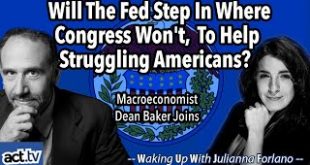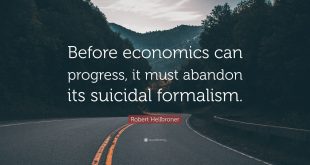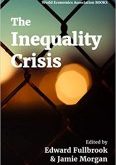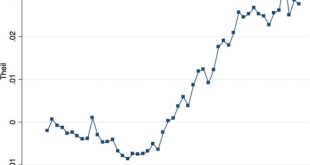from Norbert Häring ESTA, the association of European cash management companies, has published a position paper contradicting the assessment of the EU Advocate General of my case before the European Court of Justice regarding the right to pay my broadcasting fee with the legal tender, cash. The opinion of the Advocate General is a recommendation to the highest EU court. The Advocate General has more or less adopted the anti-cash stance of the EU Commission. The Board of ESTA, in its...
Read More »Will The Fed Step In Where Congress Won’t To Help Struggling Americans? Dean Baker Joins
Follow on Twitch: https://www.twitch.tv/actdottv Julianna welcomes back recurring guest Dean Baker, Macroeconomist and co-founder of the Center for Economic and Policy Research, to discuss how now that it’s become clear our lawmakers are completely useless when it comes to helping ordinary Americans get through this crisis, there are some who are hoping we can get economic relief another way: through the Fed. Economists and activists are calling for the Fed to use a method called...
Read More »Reforming economics
from Lars Syll The typical economics course starts with the study of how rational agents interact in frictionless markets, producing an outcome that is best for everyone. Only later does it cover those wrinkles and perversities that characterise real economic behaviour, such as anti-competitive practices or unstable financial markets. As students advance, there is a growing bias towards mathematical elegance. When the uglier real world intrudes, it only prompts the question: this is all...
Read More »Sunday morning rituals
from Lars Syll One of yours truly’s Sunday morning rituals is reading the obituary column of The Telegraph. This obit is rather typical: Peter Scott, who has died aged 82, was a highly accomplished cat burglar, and as Britain’s most prolific plunderer of the great and good took particular pains to select his victims from the ranks of aristocrats, film stars and even royalty. According to a list of 100 names he supplied to The Daily Telegraph, he targeted figures such as Soraya Khashoggi,...
Read More »Contemporary inequality is a challenge to economics
from Peter Radford and The Inequality Crisis The challenge of contemporary inequality is not just to the cohesion of modern society it is also a challenge to economics, because it is economics and its values that sit squarely within the social framework that has allowed inequality to become so pervasive and debilitating. We have built a society resting on only one view of liberty and equality, that of the economic sphere, rather than on a more holistic view that allows the inclusion of...
Read More »The time trend in global inequality
from James Galbraith and Jaehee Choi and The Inequality Crisis Inspection of trends and changes in inequality gives a strong clue to the sweep of events. There are four trends and three distinct turning points. From 1963-1971, no trend appears, and changes in individual countries are for the most part small. After 1971, while inequality increases in some of the wealthy countries, in much of the world it is declining. After 1980, there is a radical change, and the world enters on a period...
Read More »Government-granted patent monopolies gave Purdue Pharma incentives to push opioids
from Dean Baker Maybe this is too obvious a point, but I don’t see it mentioned in news coverage of the company’s settlement. If we could ever have a serious debate on the relative merits of government-granted patent monopolies compared with direct upfront funding, as we did with Moderna’s research on a coronavirus vaccine, the incentive that patents give to lie about the safety and effectiveness of drugs would be an important factor. Unfortunately, we may never have this debate because...
Read More »What is ‘effective demand’?
from Lars Syll Economists of all shades have generally misunderstood the theoretical structure of Keynes’s The General Theory. Quite often this is a result of misunderstanding the concept of ‘effective demand’ — one of the key theoretical innovations of The General Theory. Jesper Jespersen untangles the concept and shows how Keynes, by taking uncertainty seriously, contributed to forming an analytical alternative to the prevailing mainstream general equilibrium framework: Effective demand...
Read More »The wayward rise of machina-economicus
from Gregory Danake and RWER issue 93 The nexus of mainstream (or neoclassical) economic theory is “homo-economicus” (or economic person). It is a super being who dwells in a fairy tale land with complete information and is obligated to act hedonistically (maximizing their individual utility at the margin). Neoclassic economists merely stamp out this little cookie person, and then chuck out all the inconvenient dough, including: altruism, reciprocation, and “moral sentiments” (as Adam...
Read More »Public debt — how much is too much?
from Lars Syll. [embedded content] Public debt is normally nothing to fear, especially if it is financed within the country itself (but even foreign loans can be beneficent for the economy if invested in the right way). Some members of society hold bonds and earn interest on them, while others pay taxes that ultimately pay the interest on the debt. The debt is not a...
Read More » Real-World Economics Review
Real-World Economics Review






